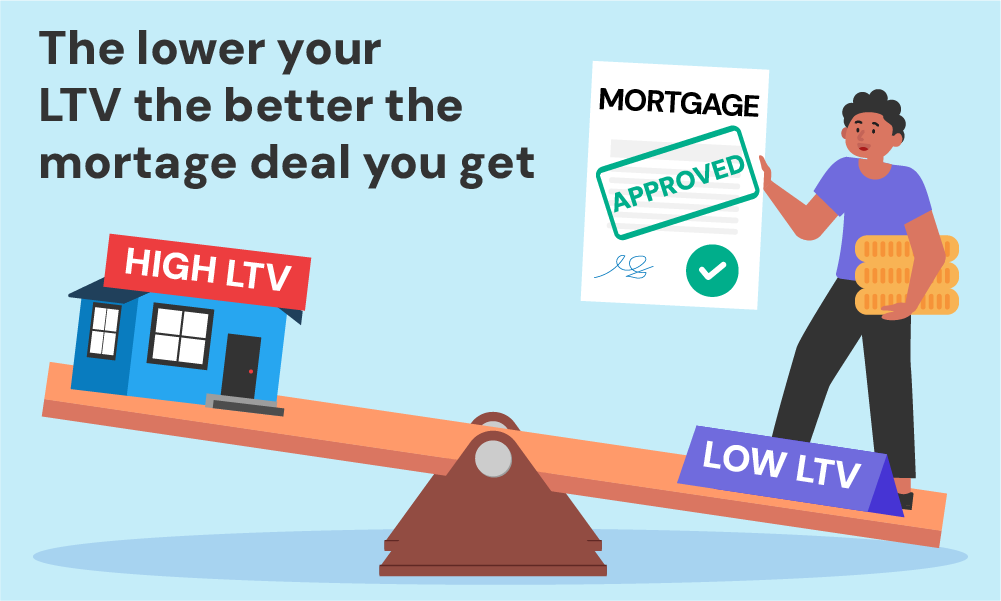- How Much Will I Pay Each Month for a £40,000 Mortgage?
- How Much Do I Need to Earn to Get a £40,000 Mortgage?
- How Does the Length of the Mortgage Affect My Repayments?
- Do I Need a Large Deposit for a £40,000 Mortgage?
- What Other Factors Impact My Mortgage Repayments?
- How To Choose the Right Mortgage?
- Key Takeaways
- The Bottom Line: How To Get a £40,000 Mortgage?
How Much Will You Pay for a £40,000 Mortgage?

Looking at a £40,000 mortgage and wondering if it’s the right amount for you? Maybe you need it to top up your savings, buy a smaller house, or clear that last chunk of your current loan.
While £40,000 might be a smaller than the average mortgage in the UK, it’s still important to be prepared before you apply
This article will help you understand what to expect from a £40,000 mortgage, covering repayments and key things to consider to make the most of it.
How Much Will I Pay Each Month for a £40,000 Mortgage?
The exact figure of your mortgage repayments depends on a couple of things like the mortgage term and your interest rate.
In the UK, the average mortgage term is 25 years. This means that if you take out 40,000 at a 5% interest rate, you’re going to pay around £234 per month.
Over those 25 years, the total interest paid will add up to £30,151, meaning you’ll repay a total of £70,151.
Now, if you stretch that same loan out to 30 years, your payments drop to around £215 per month.
Sounds tempting, right? But keep in mind, a longer term means paying more in interest over the life of the loan.
In this case, you’ll end up paying £37,302 in interest, with a total repayment of £77,302.
So, while the monthly payments are lower with a longer term, you’ll be paying a fair bit more in the long run.
Here’s a quick breakdown of how different interest rates and mortgage terms can affect your repayments:
| Mortgage Term | 2% Rate | 3% Rate | 4% Rate | 5% Rate | 6% Rate |
|---|---|---|---|---|---|
| 5 years | 525.83 | 539.06 | 552.5 | 566.14 | 579.98 |
| 10 years | 276.04 | 289.68 | 303.74 | 318.2 | 333.06 |
| 15 years | 193.05 | 207.17 | 221.91 | 237.24 | 253.16 |
| 20 years | 151.77 | 166.38 | 181.79 | 197.99 | 214.93 |
| 25 years | 127.16 | 142.26 | 158.35 | 175.38 | 193.29 |
Want to play around with the numbers yourself? Try our mortgage calculator to figure out what works best for your budget.
How Much Do I Need to Earn to Get a £40,000 Mortgage?
Most lenders in the UK base the amount they’re willing to lend on a multiple of your salary.
Typically, this is about 4 to 4.5 times your annual income. So, if you’re earning around £10,000 per year, you could be eligible for a £40,000 loan.
If you’re earning a 40k salary, the good news is you’d be well above the threshold for this mortgage amount.
In fact, with that kind of income, you could be looking at much higher borrowing limits. But for now, let’s stick with the £40,000 figure.
If your income doesn’t quite meet the mark, don’t worry. You’ve got options!
Some lenders may allow joint applications, where you and a partner or family member combine incomes to secure the loan.
It’s worth exploring, and it might make all the difference when applying.
Image
How Does the Length of the Mortgage Affect My Repayments?
If you take out a £40,000 mortgage over 10 years, your monthly payments will be higher, but you’ll pay less interest overall. This can be good if you can manage higher monthly payments, since you’ll repay your home faster.
On the other hand, choosing a longer term, like 25 or 30 years, will lower your monthly payments.
This can be helpful if you’ve got other expenses to juggle. However, you’ll end up paying more in interest over time, so you’ll shell out more in the long run.
It really comes down to what works best for your budget and financial situation.
Do I Need a Large Deposit for a £40,000 Mortgage?
The short answer is—it depends. But generally, a larger deposit is always a good thing.
Most lenders in the UK will ask for at least a 5% deposit, but if you can stretch to 10% or more, you’re golden.
Let’s say you’re buying a property worth £80,000 and need a £40,000 mortgage.
If you can put down a 10% deposit, that’s £8,000 upfront. The bigger the deposit, the smaller your loan and the less interest you’ll pay overall.
This brings us to the concept of Loan-to-Value (LTV) ratio. LTV is the ratio of your loan amount to the property’s value, expressed as a percentage.
In this case, borrowing £40,000 on a property worth £80,000 gives you an LTV of 50%. A lower LTV often means better interest rates, as lenders see it as less risky.
If your deposit is smaller, say 5%, your LTV would be higher, which could lead to higher monthly payments and fewer favourable interest rates.
That’s why saving up for a bigger deposit can really pay off in the long run.
You can use an LTV calculator to see how different deposit amounts will affect your mortgage terms and help you find the best deal.

What Other Factors Impact My Mortgage Repayments?
Before you rush off to apply for that mortgage, let’s take a quick look at a few other things that could impact how much you’ll be paying each month.
- Credit Score. This can play a big role in how much interest you’ll be offered. A strong credit score usually means better rates, while a lower one could lead to higher repayments.
- Fixed or Variable Rate. Do you want your interest rate to stay the same or change with the market? A fixed rate gives you stability (no nasty surprises), but a variable rate could mean savings if interest rates drop.
- Additional Costs. There are other costs to consider, such as mortgage fees (arrangement fees, valuation fees, etc.) and insurance (home and life insurance). If you roll these fees into your mortgage, they’ll increase your loan amount, which in turn will raise your monthly repayments.
- Property Type. The type of property can also affect your repayments. If it’s a non-standard property, like a listed building or a flat above a shop, lenders may see it as risky. This could lead to higher interest rates and bigger monthly payments.
- Type of Lender. Different lenders offer different deals. Some specialise in first-time buyers, buy-to-let mortgages, or people with bad credit. Smaller or specialist lenders may offer more flexible options but with higher rates. It’s worth shopping around or using a broker to find the best deal for you.
- Type of Mortgage. Whether you go for a repayment or interest-only mortgage also affects your payments. With a repayment mortgage, you pay off both the loan and interest, so your payments are higher, but you’ll fully own the property at the end. With an interest-only mortgage, your payments are lower because you’re only paying the interest. But at the end, you’ll still owe the full loan amount.
Image comparing repayment vs interest only mortgage. We should have this.
How To Choose the Right Mortgage?
Picking the right mortgage doesn’t have to be stressful. A qualified mortgage broker can do the hard work for you and make the process much easier.
Here’s how they can help you with a £40,000 mortgage:
- Find the best deals from a wide range of lenders.
- Secure the lowest interest rates and best terms for your situation.
- Explain your mortgage options clearly, like repayment or interest-only.
- Check your credit score and give tips on improving it.
- Handle all the paperwork and guide you through the application.
- Save you time by dealing with lenders on your behalf.
- Offer advice tailored to your unique needs.
- Help you avoid mistakes that could cost you money.
- Break down any fees and help you budget for extra costs.
- Provide ongoing support if your situation changes later on.
With a good mortgage broker, you can be confident you’re getting the best mortgage for your needs, without the hassle.
Key Takeaways
- A £40,000 mortgage can result in monthly payments of around £234 over 25 years with a 5% interest rate.
- Most lenders require an annual income of £9,000-£10,000 for a £40,000 loan, with higher multiples possible for some borrowers.
- The term length and interest rate will have the biggest impact on your monthly repayments.
- A larger deposit (5%-10% or more) can reduce your loan and get you better interest rates.
- Factors like your credit score, fixed or variable rates, and property type affect your monthly repayments.
The Bottom Line: How To Get a £40,000 Mortgage?
While £40,000 may be smaller than the average UK mortgage, the process can still feel complex. With interest rates, mortgage terms, and various lenders to choose from, it’s important to be well-prepared.
If you’re buying your first home or adding to an existing property, our guide to getting a mortgage in the UK outlines all the key steps.
And remember, a good mortgage broker can help you get the best possible deal.
So, if you want to make your mortgage journey easier than ever, reach out to us. We’ll match you with a reliable mortgage broker who can help you make the best decision for your mortgage.
Get Matched With Your Dream Mortgage Advisor...

Frequently asked questions
How do I pay off a £40,000 mortgage?
To pay off a £40,000 mortgage, you make regular monthly repayments based on your mortgage term and interest rate.
You can also overpay if your lender allows it, which reduces the total interest you pay and shortens the mortgage term.
Some people also choose to make lump sum payments to clear the balance faster. Always check if there are early repayment charges before making extra payments.
What happens if I miss a monthly mortgage repayment?
If you miss a monthly mortgage repayment, your lender will usually contact you to discuss the missed payment and explore ways to help. Missing a payment can affect your credit score and lead to late fees.
If you continue missing payments, your lender may take legal action, which could result in repossession of the property.
It’s important to speak with your lender as soon as possible if you’re struggling to make repayments.
Is it easy to get a £40,000 loan?
Getting a £40,000 loan depends on your financial situation. Lenders will assess your income, credit score, and other factors to determine whether you can afford the loan.
While it’s a smaller mortgage compared to the average, lenders still need to ensure you meet their criteria, such as having a stable income and good credit history.
Working with a good mortgage broker can help you find lenders who are more likely to approve your application.




